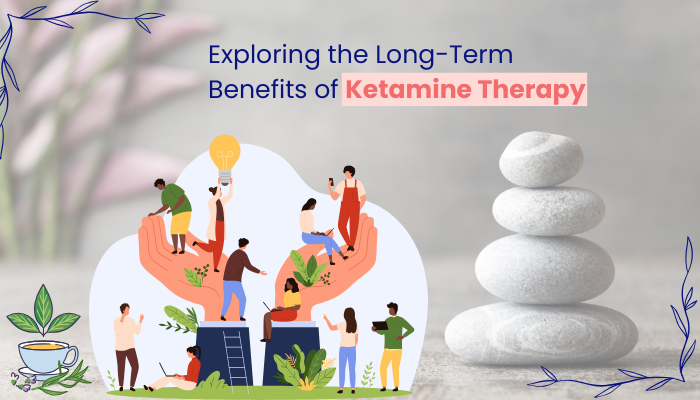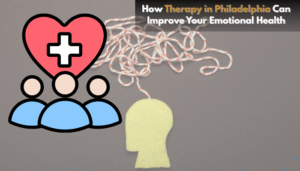Exploring the Long-Term Benefits of Ketamine Therapy
A few years ago, the idea of using ketamine to treat mental health disorders seemed radical. It was known mostly...

A few years ago, the idea of using ketamine to treat mental health disorders seemed radical. It was known mostly as an anesthetic-or, depending on who you asked, a party drug. But today, ketamine therapy is gaining traction as one of the most promising treatments for depression, anxiety, PTSD, and other mood disorders. What’s even more exciting? The long-term benefits of ketamine therapy may extend far beyond temporary symptom relief.
We’re no longer just asking if ketamine works. We’re starting to ask how long it works, why it helps, and what it means for the future of mental health care.
If you’ve ever wondered whether ketamine therapy is just a quick fix or a lasting solution, this article dives deep into the science, personal stories, and clinical outcomes that paint a fuller picture of what this treatment can truly offer.
What Is Ketamine Therapy?
Let’s start with the basics. Ketamine therapy is the use of low doses of ketamine-administered under medical supervision-to treat conditions like:
- Treatment-resistant depression
- Generalized anxiety disorder
- PTSD
- Bipolar depression
- OCD
- Chronic pain
Unlike traditional antidepressants, which typically target serotonin or dopamine levels and may take weeks to work, ketamine interacts with the brain’s glutamate system. This triggers a cascade of effects that help increase neuroplasticity, or the brain’s ability to form new connections.
Ketamine is often delivered through:
- Intravenous (IV) infusion
- Intramuscular injection
- Oral lozenges
- Nasal spray (e.g., FDA-approved Spravato)
Sessions typically take place in a calming setting, sometimes with therapy before and after to help process the experience-often referred to as ketamine-assisted psychotherapy (KAP).
Immediate Relief: A Game-Changer for Mental Health
One of the most well-known benefits of ketamine therapy is how fast it works. Some patients report a reduction in depressive symptoms within hours after treatment. For those suffering from suicidal ideation or severe anxiety, this can be lifesaving.
Imagine battling depression for years, trying medication after medication with little relief-and then feeling a shift after just one ketamine session. That’s the kind of change many people describe.
But what about after that first wave of relief? What happens in the weeks, months, or even years that follow?
That’s where the long-term story of ketamine therapy becomes even more compelling.
1. Sustained Mood Improvement
Initial research and clinical feedback suggest that the effects of ketamine therapy can last far longer than previously expected-especially when it’s paired with integration therapy and healthy lifestyle choices.
A 2023 study published in Translational Psychiatry found that 70% of patients who responded to ketamine infusions maintained improvements in mood for at least three months. Some patients reported continued benefits for six months or longer with occasional booster sessions.
Of course, this depends on the individual, the condition being treated, and the treatment plan. But for many, ketamine therapy doesn’t just “lift the fog” temporarily-it creates space for deeper healing to take place.
2. Improved Neuroplasticity and Emotional Flexibility
What really sets ketamine apart is its impact on neuroplasticity-the brain’s ability to grow, change, and adapt.
For people stuck in rigid thought patterns, trauma loops, or chronic hopelessness, this is a game-changer. After ketamine therapy, patients often find themselves better able to engage in therapy, try new coping strategies, and respond differently to triggers.
One therapist in Philadelphia shared, “It’s not that the trauma disappears, but the grip it has on the brain weakens. Clients become more receptive to change.”
That emotional flexibility leads to improved relationships, work performance, and overall quality of life.
3. Decreased Reliance on Daily Medications
Some patients undergoing ketamine therapy are able to reduce or even discontinue long-term antidepressant use under medical guidance. While this isn’t the case for everyone, the potential for fewer side effects, fewer pills, and a more active role in one’s own mental health is empowering.
That said, ketamine is not a replacement for traditional care in all cases. It’s best viewed as a complementary tool-one that can significantly shift the mental health landscape when used thoughtfully.
4. Reconnection With Meaning and Purpose
Here’s something you won’t always find in scientific studies, but it’s repeated time and again in personal accounts:
“I felt like I could see myself again.”
“I remembered what it felt like to hope.”
“It helped me feel connected to my life, my family, and my purpose.”
This reconnection with meaning is one of the most powerful long-term effects of ketamine therapy. It’s not about escaping pain-it’s about rediscovering why life is worth living.
5. Enhanced Response to Talk Therapy
The period following a ketamine session is often referred to as a “window of opportunity.” During this time, the brain is more receptive to new ideas, healthier thought patterns, and emotional exploration.
Patients who previously felt stuck in therapy often describe a breakthrough after beginning ketamine treatment.
In this way, ketamine therapy acts as a catalyst-it doesn’t do the work for you, but it makes the work more possible.
A Real Story: From Numb to Awake
Let’s talk about Mark, a 38-year-old teacher in Philadelphia who tried everything to cope with his depression: SSRIs, weekly therapy, meditation apps, journaling-you name it. Nothing stuck. He described himself as “functioning but numb.”
After his third ketamine session, something shifted. He didn’t suddenly become happy, but he noticed things agai-the smell of coffee in the morning, the comfort of a hug from his daughter, the urge to reach out to an old friend.
Over the following months, Mark stayed in therapy, exercised more regularly, and even started painting again.
That’s the ripple effect we’re talking about when we discuss the long-term benefits of ketamine therapy.
What to Know Before Starting
If you’re considering ketamine therapy, here are a few tips:
- Choose a reputable provider. Look for clinics with licensed medical professionals and experience in mental health.
- Ask about integration support. Therapy before and after your sessions can significantly boost your outcomes.
- Understand the costs. Ketamine therapy can be expensive, and it’s not always covered by insurance-though some programs offer payment plans.
- Be open, but patient. Every individual responds differently. Give yourself time to explore the process.
Final Thoughts
In 2025, we’re witnessing a quiet revolution in mental health treatment—and ketamine therapy is leading the way. What began as an experimental option has grown into a scientifically backed, emotionally transformative tool that’s helping thousands of people find their way back to themselves.
And while it’s not a cure-all, it’s more than a temporary fix. With the right support, ketamine therapy can lead to lasting change-new neural pathways, renewed purpose, and a deeper sense of self.
If you’re in the Northeast and considering this path, ketamine therapy Philadelphia programs are some of the most established in the country, offering personalized care and clinical excellence.
Because healing isn’t just about getting through the day. It’s about rediscovering what it means to truly live.
Click – thenewsus.com





